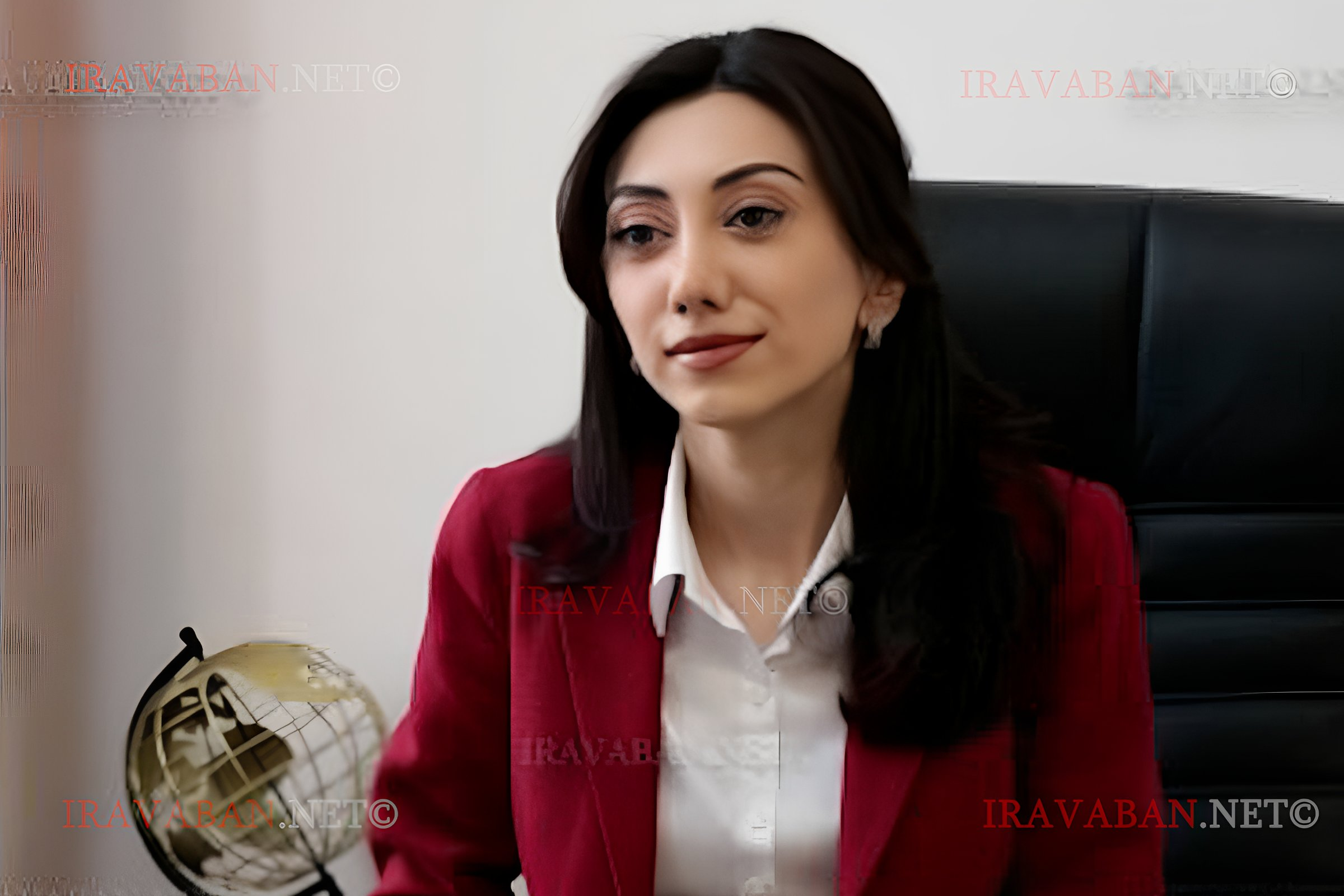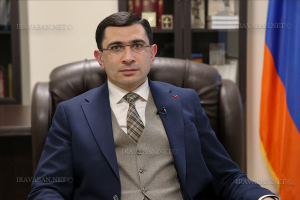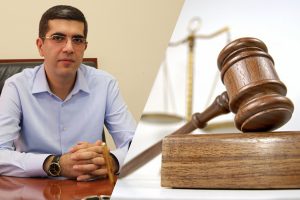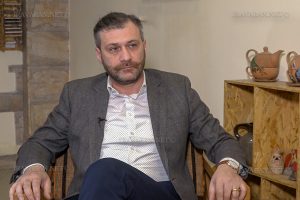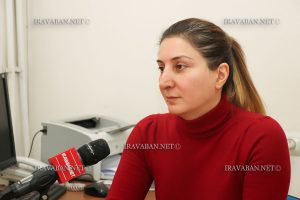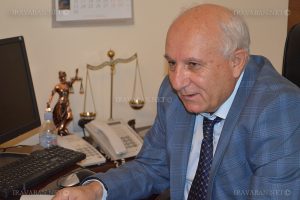As part of Iravaban.net‘s interview series “Armenian judges” we spoke with Lily Drmeyan, a judge specializing in civil cases at the Anti-Corruption Court. The judge shared about her career choice, the unique characteristics of a judge’s work, challenges in the system, and other relevant issues.
– Ms. Drmeyan, could you tell us about your choice of profession? Your father was also a judge; did that circumstance influence your decision?
– My choice wasn’t accidental. I was born and raised in a family of lawyers. My parents are lawyers with many years of experience, my brother is also a lawyer, only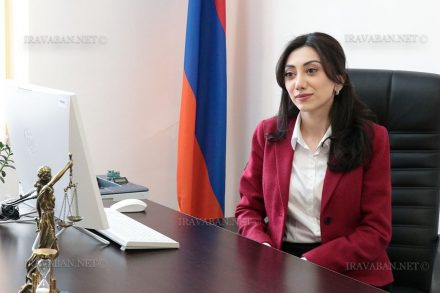 my sister has a different profession—she’s a diplomat. I grew up in an atmosphere of intense discussions about legal issues, numerous debates and conversations about court cases, and I think in some way, this subconsciously left its mark and influence on me. But that wasn’t the only basis for my career choice, because gradually, especially during my school years, I always pondered who I would be years later. I approached the question very seriously, considering how fateful it could be. Throughout my education, I began to take many factors into account, such as my temperament, the environment where I expressed myself, my love and interest in humanities, and my ability to not rush when making decisions and to look at issues from all sides. The characteristic behavior of a judge and looking at problems through a judge’s eyes have always been present in me, while, for example, attorney work—defending one side’s interests through all legitimate methods—wasn’t close to my heart, which is also why I chose to be a judge rather than an attorney.
my sister has a different profession—she’s a diplomat. I grew up in an atmosphere of intense discussions about legal issues, numerous debates and conversations about court cases, and I think in some way, this subconsciously left its mark and influence on me. But that wasn’t the only basis for my career choice, because gradually, especially during my school years, I always pondered who I would be years later. I approached the question very seriously, considering how fateful it could be. Throughout my education, I began to take many factors into account, such as my temperament, the environment where I expressed myself, my love and interest in humanities, and my ability to not rush when making decisions and to look at issues from all sides. The characteristic behavior of a judge and looking at problems through a judge’s eyes have always been present in me, while, for example, attorney work—defending one side’s interests through all legitimate methods—wasn’t close to my heart, which is also why I chose to be a judge rather than an attorney.
I never received any advice on choosing my profession. There was a conviction in my circle that I would become a lawyer, but my family never gave me advice or guidance, though they supported my choice.
My professional career began in court from the very first steps. This choice wasn’t accidental; I was convinced that for a lawyer, the court is one of the best schools, if not the very best, and I wasn’t wrong.
– You mentioned that there was no guidance regarding your career choice, but I’m sure there was advice from your parents based on their many years of experience. How has that helped or continues to help you?
– There are many discussions about various legal issues at home, including at my initiative. I share my concerns about legal matters, although I usually and mostly try to address my questions by studying literature and reading court acts.
In reality, looking back at each piece of advice, I understand the deep layers they contain. One of the pieces of advice I received from my father that I value most is to consider the provisions of the law within the entirety of the law when applying it—not detached from other parts of the law, to understand the law from the perspective of legal principles, to understand what the legislator wants to say with that law. That has always been a vigilance call for me to comprehend the applied law in its entirety.
 – You worked as a court president’s assistant, then as a judge’s assistant, and then as a judge. Didn’t such responsibility at a relatively young age frighten you?
– You worked as a court president’s assistant, then as a judge’s assistant, and then as a judge. Didn’t such responsibility at a relatively young age frighten you?
– I should add that I also worked at the Court of Cassation as a chief specialist of the legal expertise service, I was an expert. Let me put it this way: in my view, the scope of responsibility is exactly the same for both a novice judge and a judge with many years of experience; I hold that conviction.
I wouldn’t call the feelings and experiences I had at the beginning of my tenure fear. I started my tenure at 27 and realized that I had the task of quickly focusing my professional abilities, knowledge, strength, and energy. I had the challenge of learning as much as possible from the teachers I met on my path and from training courses.
I should also note that in my case, there was a double difficulty because the time allocated for the training program was very tight. During that time, I tried to do everything possible so that from the very beginning of my tenure, I could properly fulfill my duties.
Let me put it this way—there was no fear, there was a very deep sense of responsibility.
– How do you respond to negative opinions and discussions related to your work? Even if relatives or friends tell you that some issue concerning you is being discussed on social media, etc.
– I have a very positive attitude toward any justified, substantiated, and healthy criticism. This is also very important for understanding how clear the court’s actions have been to the public, so that, if necessary, responses can be provided in the established manner, or so that this or that part of the proceedings can be presented more visibly and accurately in practice in the future.
Self-criticism alone is not enough in this work. I am self-critical, but I don’t consider that sufficient for not making mistakes and making the right decisions.
I never display a dogmatic attitude that “this is right and that’s it.” Naturally, when making a decision, I have my inner conviction and never doubt that I’m doing the right thing. The most difficult moment is reaching that inner conviction—not conducting a hearing, not writing a judicial act… the most difficult thing is forming an inner conviction that you are truly acting fairly, in accordance with the requirements of the law.
right thing. The most difficult moment is reaching that inner conviction—not conducting a hearing, not writing a judicial act… the most difficult thing is forming an inner conviction that you are truly acting fairly, in accordance with the requirements of the law.
I have a very positive attitude toward criticism—with only one exception: when it is done irresponsibly, by incompetent people, without deeply understanding the requirements of the law that guided the judge. Such unfounded criticism is unacceptable to me, as it’s not a matter of my personal attitude, but such phenomena can inspire distrust toward the court. Especially nowadays, legal processes seem quite complex to citizens, there is that problem, and often some judicial acts, some court actions are not correctly perceived by people who aren’t connected to jurisprudence.
Well-founded criticism also leaves room for feedback: you think about what wasn’t clear to citizens so that in the future you can simplify and make your actions more understandable through your actions.
– Ms. Drmeyan, the institution of confiscation of illegally acquired property is relatively new in Armenia. As a judge examining such cases, have there been instances when attempts were made to guide or pressure you regarding cases of public interest?
– Never has there been any pressure, influence, interference, or even an attempt from anywhere, from anyone, in any form toward me. And let me say, that is very positive and satisfying for me. As a judge, I focus only on my work. Naturally, I evaluate this positively. Here it should be noted that there is great public interest in the court regarding cases of public resonance, about what the court will decide in that case.
– We can also emphasize the fact that society’s expectations for such cases are quite high. Do people’s wishes in any way affect your work?
– In my opinion, society’s expectation should be the fair, effective resolution of any case in accordance with the Constitution and laws, without delays, without “delayed justice.”
But no expectation or anticipation from society should have, and does not have, any influence on me. First, I approach all court cases in my proceedings with the same principle, regardless of who the party to the proceedings is. There is a fact, there is a law, I must apply it and resolve the dispute; no other circumstance can be significant for me.
– Professionals in the field often speak out about the abuse of rights by the responding party in cases related to the confiscation of illegally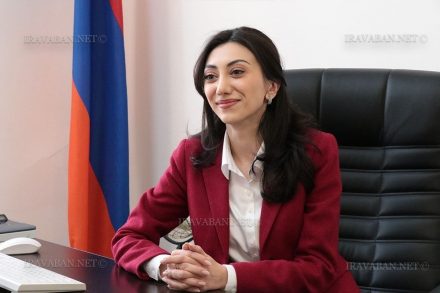 acquired property. What is your opinion on this?
acquired property. What is your opinion on this?
– I’ve heard such opinions, but I thought they had passed over time, that this was an initial impression among specialists. Experience has shown that the long duration of these cases is also due to many objective factors.
Let me first mention a few: the lengthy examination of claims for confiscation of illegally acquired property may be conditioned by the willingness of both parties to conduct certain negotiation processes outside of the sessions, which I always respect.
Respondents present evidence regarding their income, which requires time for the claimant to review and evaluate. These actions also result in modifications to the claim. The long examination of the case may be conditioned by the consideration of motions to permit changes to the basis and subject of the claim, and moreover, if there is a major factual change to the claim basis, one could say we start the case examination from zero again.
The next circumstance is the mandatory requirements of legislation: some procedural actions require time, they delay other actions to be performed, and this also affects the duration of the case.
The process of clarifying claims takes a long time, and that’s logical because the claims are extensive, and numerous issues need clarification.
As for the abuse of procedural rights by this or that participant in the proceedings, the court has not only the right but also the obligation to apply judicial sanctions, to give proportionate assessments to the abuse of rights and cases of dishonest fulfillment of procedural obligations.
Let me say that the Civil Procedure Code provides quite clear and effective mechanisms, including the toolkit introduced at the end of last year by Article 155.2 of the Code, with the possibility of applying restrictions on certain procedural rights in cases of periodic abuse.
In cases pending in my proceedings, if there are such abuses, there is, naturally, a response from the court.
– What are the current challenges faced by judges examining cases of confiscation of illegally acquired property?
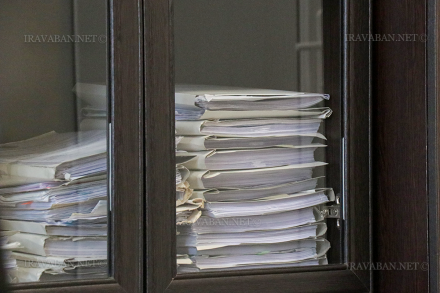 – The mere fact that cases on claims for confiscation of illegally acquired property are the result of the introduction of a new institution is itself a challenge, because when examining cases on claims for confiscation of illegally acquired property, we don’t have established judicial practice; in my view, it is in an embryonic, developing state (this doesn’t refer to cases on applications for providing information containing secrets as provided by law). There is also the challenge of maintaining the indicative timeframes for case examination set by the Supreme Judicial Council’s decision for the Anti-Corruption Court. Due to certain objective circumstances, based on the requirements for effective case examination, there is a serious risk of violating the established indicative timeframes.
– The mere fact that cases on claims for confiscation of illegally acquired property are the result of the introduction of a new institution is itself a challenge, because when examining cases on claims for confiscation of illegally acquired property, we don’t have established judicial practice; in my view, it is in an embryonic, developing state (this doesn’t refer to cases on applications for providing information containing secrets as provided by law). There is also the challenge of maintaining the indicative timeframes for case examination set by the Supreme Judicial Council’s decision for the Anti-Corruption Court. Due to certain objective circumstances, based on the requirements for effective case examination, there is a serious risk of violating the established indicative timeframes.
Within the framework of this issue, I find it necessary to emphasize that more training is needed for the field. I have participated in 3-4 trainings aimed at studying foreign experience, which I think is too few. As a judge, I would like more attention to be paid to this issue.
– What was your motivation to become a judge of the Anti-Corruption Court and to examine the above-mentioned cases?
– My choice of anti-corruption civil specialization was also not accidental. During my time working as an expert at the Court of Cassation, I had the opportunity to deal with the procedure for confiscation of illegally acquired property in connection with applications for providing information containing secrets. I had the experience of conducting certain studies, participated in preparing drafts of judicial acts, and was engaged in legal expertise in that field. From that period, I developed an interest in the field. The newness of the field is already motivating, as it provides an opportunity to be one of the builders of the establishment of justice in the field, to make a unique contribution to that work. And on the other hand, the field is sufficiently narrow to become maximally skilled in it and to establish oneself as a specialist.
It’s not accidental when the US experience is cited as an example; there, lawyers have quite narrow specializations, and that helps the specialist to be more knowledgeable and professional in their work.
– Have you had verdicts in cases of confiscation of illegally acquired property, and which case is currently reaching its logical conclusion?
– Recently, I had a verdict related to two claims for confiscation of illegally acquired property where a statute of limitations was applied, and on that basis, the claim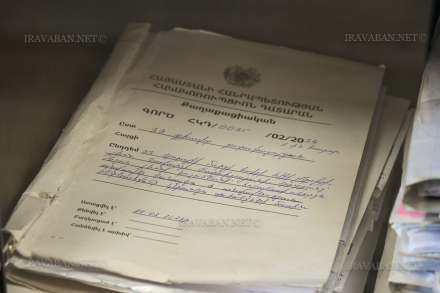 was rejected. A case was separated for those claims, the verdict was appealed by the prosecutor’s office, and the separated part of the case is currently in the Court of Appeal, while the examination of the remaining part continues in my proceedings.
was rejected. A case was separated for those claims, the verdict was appealed by the prosecutor’s office, and the separated part of the case is currently in the Court of Appeal, while the examination of the remaining part continues in my proceedings.
Two cases in my proceedings are in the trial phase. In one of them, the majority of evidence has already been examined during the trial. If the trial concludes at the next court session, a verdict will be issued at the beginning of April.
– At what level is people’s trust in the bodies administering justice now?
– I think public trust is growing. My impression is also built on stimuli reaching through the media, and I also feel it during the proceedings; you feel the participants’ trust in the court from their demonstrated behavior. The proceeding is strictly formal but a living process. We all work, and during that, there are human emotions, assessments, the behavior displayed by people is seen by the judge. These have also affected my impression; I see trust.
One of the main arrows of the anti-corruption strategy undertaken by the state continues to be directed precisely at judicial-legal reforms, including the institutional strengthening of the anti-corruption justice system. This is also an important step from the perspective of strengthening trust in the courts.
The personal efforts of the judge are also very important. There is always room to improve work; mistakes must be minimized, excluded as much as possible.
– If your child decides to become a judge in the future, would you want to see them in that role?
– If I myself see that my child is capable of assuming that position with dignity, I will be in favor, I will encourage. The profession isn’t essential here, because I would want my child to be a worthy citizen for their homeland, useful and beneficial for their society, to leave a better world for their heirs, to choose a profession that allows them to self-realize with the drive to have a better society. What’s important is to approach their chosen profession, craft, work with love and all responsibility.
– Ms. Drmeyan, how do you assess the role of women’s involvement in the judicial system? How does this help the system be more complete?
– The question is quite extensive. Without abusing the audience’s patience, I think it’s necessary to talk about the main aspects.
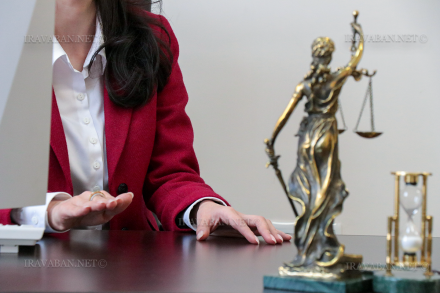 It is scientifically proven that women and men have significant differences in thinking. Especially in collegial bodies, the equal involvement of women and men in decision-making ensures that solutions and decisions are profound and comprehensive. Women have a unique life experience, are more inclined toward empathy, which is also manifested when making decisions in judicial work.
It is scientifically proven that women and men have significant differences in thinking. Especially in collegial bodies, the equal involvement of women and men in decision-making ensures that solutions and decisions are profound and comprehensive. Women have a unique life experience, are more inclined toward empathy, which is also manifested when making decisions in judicial work.
Today, empathy or being patient is no longer perceived as a sign of weakness when making decisions, as in the early past when power was associated with strength and severity. Society wants its judicial system to understand its needs, needs to see a judicial power that is open to social developments, without stereotypes, and professional.
Now the legislation provides all the prerequisites for having such a judicial system, moreover, it encourages women’s involvement. In the last few years, there has been a significant increase in the number of female judges in our country, but, unfortunately, the indicator of female judges’ involvement is still just over 30 percent. I would find it difficult to say what prevents having more female judges; I assume it may be conditioned by intrafamilial circumstances, personal prejudices. It may be doubly difficult for women to combine other cares and work. But with time, the possibilities for neutralizing such circumstances increase, women are able to fully contribute to the development of the judicial system, the establishment of effective judicial power.
I think that the concerns or skepticism toward female officials that still persist are surmountable. During tours, I’ve had the opportunity to be in Sweden, Finland, which are among the first in the world in terms of gender equality coefficient and are truly among the best examples of how a woman can fulfill her social role as a woman while being actively involved in public life as a specialist. According to the World Economic Forum’s 2024 report, Armenia ranks first in the region in gender equality. In our country, there are numerous examples of female judges who have succeeded both in the professional arena and in personal life.
– When a female judge presides over a court session, do you feel a special attitude from those present at the session?
– During court sessions, I have often felt a more pronounced courtesy, benevolent attitude; this contributes to conducting a constructive and effective proceeding. I myself try to ensure a maximally calm atmosphere, to create a freer field for the participants in the proceedings, so that the process is not rigid, and more circumstances of the case become clear both for the court and for the parties.
In the initial period, I sometimes felt manifestations of skepticism; a young female judge still has to prove that the skepticism toward her is unfounded.
– Does the profession of a judge in Armenia continue to remain a “man’s” job?
– Not at all. Again, I emphasize that in Armenia, there are numerous examples of female judges who have succeeded both in the professional arena and in personal life, who with equal responsibility, diligence, and professionalism share the work of the court at all instances. I am hopeful that these examples will continue to increase in the near future.
– What legal significance does Women’s Month have?
– The month from International Women’s Day to the Feast of the Annunciation of the Holy Mother of God is an opportunity every year to evaluate efforts for the protection of women’s rights and gender equality, to reflect on what needs to be done in this direction. The imperative that was at the basis of the recognition of International Women’s Day has now become a part of history, and it is evident that in Armenia, the socio-psychological and legal obstacles that were barriers to the establishment of women in society and the full protection of their rights and freedoms have been overcome.
Mariam Antonyan

